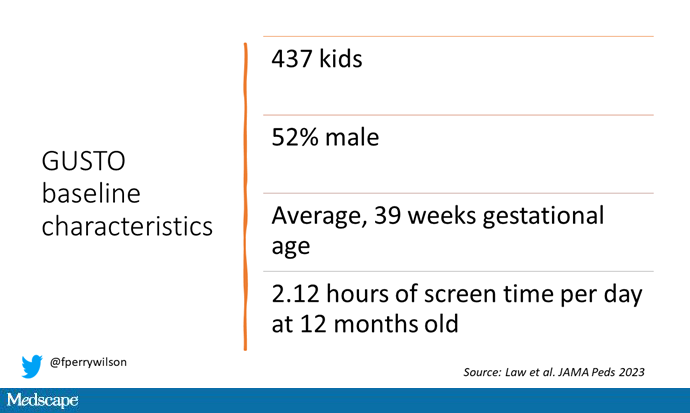This transcript has been edited for clarity.
Welcome to Impact Factor, your weekly dose of commentary on a new medical study. I'm Dr F. Perry Wilson of the Yale School of Medicine.
The term "screen time" has been around for nearly 100 years, though for the majority of that period it referred to the length of a movie. Cut to 1991 (according to the Oxford English Dictionary) and a new use of the term appeared in Mother Jones magazine. Since then, "screen time" the phrase and screen time the amount of time kids spend on screens have both skyrocketed. It is this phrase that gives me more parental guilt than any other. My name is Perry and my kids use screens.
Just how much am I hurting their brains?
Screen time emerges again as a topic for discussion this week because of this paper, appearing in JAMA Pediatrics, which ties some oft-missing physiology into the screen time/executive function relationship and focuses on a particularly interesting group of screen-watchers: infants.
Researchers from the National University of Singapore leveraged an ongoing study called GUSTO — Growing up in Singapore Towards Healthy Outcomes. In 2009 and 2010, parents of 437 children at 12 months of age reported on their screen time usage. Mean screen time in these 12-month-olds? Around 2 hours a day.

I'll slip in here that the CDC recommends essentially zero screen time in this age group.
The main thrust of the study was linking those screen time reports to measures of executive function 9 years later. Now, executive function is a broad concept, but basically, the ability to modulate your behavior to achieve your goals is something that, I think we can all agree, is probably a good thing. The researchers measured executive function via three tasks, and performance on all three tasks was worse among kids who had higher screen time.
But these scores are often hard to quantify. Like, if I tell you that each hour of screen time led to a 0.5-point lower score on the NEPSY-2 index, that wouldn't have much meaning. I took the liberty of displaying the score distributions graphically, based on numbers from the paper. Basically, each hour of screen time shifts the executive function curve to the left like this:

A modest effect overall.
That's all a bit abstract, but the authors also asked teachers to rate their 9-year-old students in terms of attention problems and general executive control problems. The more screen time the kid had at 12 months, the worse they did on these teacher reports as well.
But what I really like about this study is that they dug into the brains of these kids a bit. Not literally, of course. At 18 months, 150 of the kids underwent a full EEG, at rest, while sitting on a caregiver's lap watching bubbles being blown.
And here too, there were significant differences in the brains of kids associated with how much screen time they got at 12 months, with more theta waves and less beta waves linked to more screen time.

Theta waves, to a non-neurologist like me, are the "zone-out" brain waves — what you have when you're driving on the highway, not paying attention to anything, and forget the last 5 minutes of what you did. Which makes sense looking at a kid zoned out watching TV, but it's not exactly clear that these waves function the same way in a 12-month-old brain as they do in a 40-year-old driving down the highway.
What's really interesting, though, is that the researchers were able to show that part of the link between screen time at 12 months and executive function at 9 years was mediated by those EEG differences. In other words, the changes in the brain evident on those early EEGs might hint at a mechanism by which screen time affects childhood development.

But before we self-flagellate too much for melting our children's brains just because we needed a moment's quiet to have a cup of coffee in peace, let's remember that lots of factors increase screen time use and may impact childhood development independent of screen time use. There are socioeconomic factors — screens can function as babysitters in a pinch. There are, no doubt, parental factors as well — might we be more likely to sit our kids in front of screens when our own psychological state does not allow us to be fully present in their lives? And might it be those issues that lead to their worse executive functioning, with screens an innocent bystander?
I should also mention that, at the time this study started in Singapore, screen time would have mostly been television; tablets and handhelds were just sort of emerging. And I think there is good reason to believe that watching TV — a passive, theta-heavy activity — and playing on a tablet are different things. But, as they say, future studies will tell.
Last, my parental pet peeve about screen time studies: No one ever mentions, or measures, the impact of screen time on the parent. There are plenty of times when I have been thankful that my kids are on screens: airport delays, traffic jams, moments when I want to have a quiet talk with my wife over a glass of wine. It lowers my stress level. And that might be good for kids. At least until the guilt sets in.
F. Perry Wilson, MD, MSCE, is an associate professor of medicine and director of Yale's Clinical and Translational Research Accelerator. His science communication work can be found in the Huffington Post, on NPR, and here on Medscape. He tweets @fperrywilson and his new book, How Medicine Works and When It Doesn't, is available now.
Follow Medscape on Facebook, Twitter, Instagram, and YouTube
Credits:
Image 1: F. Perry Wilson, MD, MSCE
Image 2: F. Perry Wilson, MD, MSCE
Image 3: JAMA Pediatrics
Image 4: JAMA Pediatrics
Medscape © 2023 WebMD, LLC
Any views expressed above are the author's own and do not necessarily reflect the views of WebMD or Medscape.
Cite this: F. Perry Wilson. Infant Screen Time Spells Trouble in School - Medscape - Jan 30, 2023.














Comments